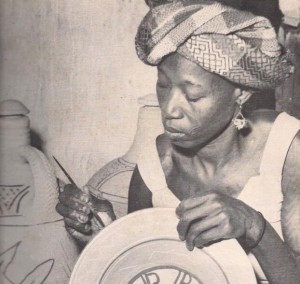
Hadiza Ladi Kwali born in c.1925, was a Nigerian potter, the best known one in her time whose work won international acclaim for its ingenuity and beauty. Ladi Kwali was a native of Kwali village in the Gwari region of Northern Nigeria. Growing up in a community where pottery was a common craft for the womenfolk, she started learning the art as a child. She however had no formal education. Kwali’s work initially was traditional to the core. She made vessels (pots, water jars, cooking pots) using the traditional method of coiling, after which she incised geometric and figurative patterns on them, and then fired them in a bonfire. So ingenious and beautiful were her works that some of them were acquired by the Emir of Abuja at the time.
Career
Kwali’s work initially was traditional to the core. She made vessels (pots, water jars, cooking pots) using the traditional method of coiling, after which she incised various patterns on them, and then fired them in a bonfire. So ingenious and beautiful were her works that some of them were acquired by the Emir of Abuja at the time. Michael Cardew, an English studio potter who was then working in Africa noticed Kwali’s work in the Emir’s palace and invited her to join his training centre in Abuja. She joined the training centre as the only female potter in 1954 and learnt to make pots with the potter’s wheel. She also learnt the sgraffito decoration technique (a technique that involvesmaking two successive layers of contrasting slip to an unfired ceramic, and then scratching the top layer to produce decorative outlines).
She continued to produce pots using the traditional methods except that they were fired in high temperature kilns. Therefore, her creations became a kind of hybrid of traditional African pottery with Western studio pottery. Over time, she began to follow Cardew on tours in different countries, and her work became known in Europe, Britain and America, where they were widely applauded. Despite her lack of formal education, she was able to give several lectures on her art of pottery, home and abroad, with the aid of interpreters and her warm and cheerful personality till her death in 1984.
Honours
In 1963, she was made an MBE — Member of the Most Excellent Order of the British Empire. She was awarded a doctorate by Ahmadu Bello University, Zaria and the Abuja Pottery was renamed Ladi Kwali Pottery as a major street in Abuja was named after her. Ladi Kwali Hall in Sheraton Hotel, Abuja, was also named after her. Ladi Kwali’s portrait is on the twenty naira note. She is the only woman whose portrait is on a Nigerian currency note. Kwali left a legacy of hard work, dedication, and living above limitations. She has been described as ‘a woman with magic fingers’, and ‘the mother of pots’.
